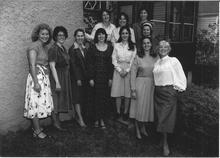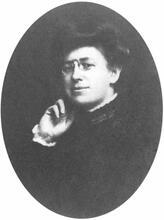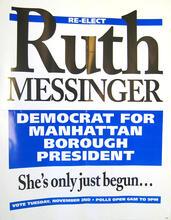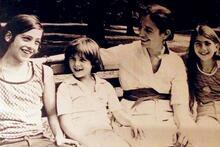Marjorie Wyler
Marjorie Wyler first began exploring her Jewish identity in college. She did her graduate studies at the New School and subsequently taught at the Jewish Theological Seminary of America, beginning in 1938. She remained at JTS for over 50 years and was also involved in a weekly radio program that made Jewish learning accessible to anyone. Along with producing the show, which was adapted for television, Wyler worked with many public service and Jewish organizations, including the UJA-Federation and a Jewish summer camp.
Marjorie Wyler was a pioneer in the presentation of Judaism to the American public. Her involvement in religious broadcasting, coupled with decades of public relations work, made her an advocate for the ethics of social justice inherent in Judaism.
Family and Education
Marjorie Goldwasser Wyler was born on September 23, 1915, in New York City, the eldest child of Israel and Edith (Goldstein) Goldwasser, who were secular upper-middle-class Americans of German Jewish descent. She had a brother, Edwin, and a sister, Joan. Israel Goldwasser held a Ph.D. in education and served as a public school superintendent before becoming the first executive director of the New York Jewish Federation in 1915. Edith Goldwassser was a teacher who was active in child welfare issues.
Marjorie received no Jewish education as a child. After attending the Horace Mann School, she went on to Bryn Mawr, where she earned both her B.A. and M.A. in philosophy. It was at this Quaker-run college that she first began to explore her faith. With Jews as a tiny minority of the student body, she was forced to confront her identity. She took general courses in religion and supplemented them with independent reading. She returned to New York, where she did graduate coursework in philosophy and psychology at the University in Exile at the New School.
In 1938 she married Wilfred Wyler, an accountant. The couple had two daughters: Ruth Messinger, formerly the Manhattan borough president and president of the American Jewish World Service, and Barbara Gold, a pediatrician. Wyler became more observant in her own home and began observing SabbathShabbat. The family also affiliated itself with the Conservative movement.
Jewish Theological Seminar and Eternal Light Radio
Also in 1938, Wyler began her professional relationship with the Conservative movement when she accepted her first position at the Jewish Theological Seminary of America. At a salary of $1,300 a year, Wyler was the second employee in what would become the Department of Public Information. She continued to work at JTS for over half a century. While researching and writing public relations materials, Wyler received additional exposure to Judaica.
In October 1944, Eternal Light Radio debuted under the aegis of Milton Krenz, whom Wyler assisted. This weekly radio program revolutionized the use of mass media for Jewish education. As Wyler explained it, its double goal was to show that “Judaism was the best-kept secret going and to explain [it] in a non-evangelical, non-emotional way.” Eternal Light expanded to television in 1948. Programming varied from dramatic shows about great Jews in history to episodes about the holidays.
Over the ensuing decades, Wyler was involved with all aspects of Eternal Light, eventually serving as its executive producer. Using new technology to transmit traditional Jewish values worked wonders. For thousands of people, Eternal Light was their only connection to their heritage. The television series continued, although in a reduced annual format, until 1993.
Wyler’s work at JTS encompassed all public presentation, ranging from speechwriting to fostering friendly relations with the press. In every task, she functioned as an astute and articulate liaison between the Jewish and secular worlds. After retiring from the seminary in 1993, Wyler remained active in the religious and communications fields, inter alia serving as a consultant for religious television programming. She was also involved with many organizations, including the UJA-Federation and the Mayor’s Commission on Foster Care. She served for fifty years as board member and onetime president of Surprise Lake Camp, the oldest Jewish sleepaway camp in the US. Perceiving Judaism as a source of ethical inspiration, she observed that, “We become more secure of our place in the scheme of things as we mend the world.”
Marjorie Wyler died of respiratory failure on July 22, 2002.
Department of Radio and Television, Jewish Theological Seminary of America, NYC; Wyler, Marjorie. Interview with author, December 6, 1995.
Krah, Markus. "Role Models or Foils for American Jews? "The Eternal Light", Displaced Persons, and the Construction of Jewishness in Mid-Twentieth-Century America." American Jewish History 96, no. 4 (2010): 265-86.
“Paid Notice: Deaths, Wyler, Marjorie Goldwasser.” The New York Times, July 24, 2002.
Shandler, Jeffrey. “Turning on The Eternal Light.” In Jews, God, and Videotape: Religion and Media in America. NYU Press, 2009.













